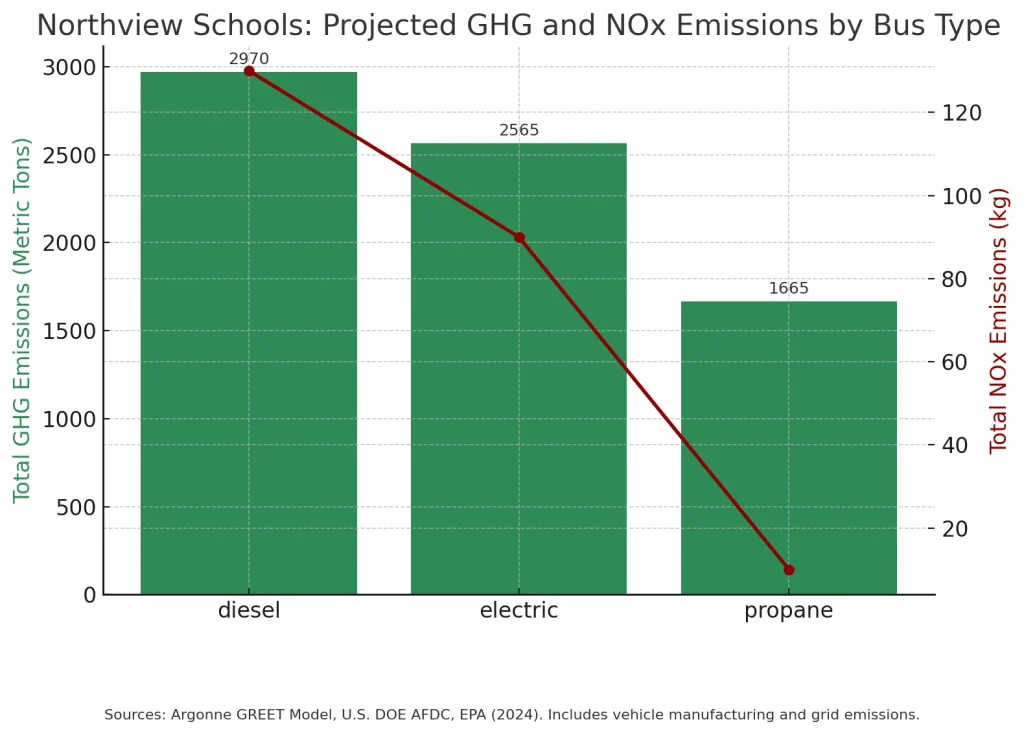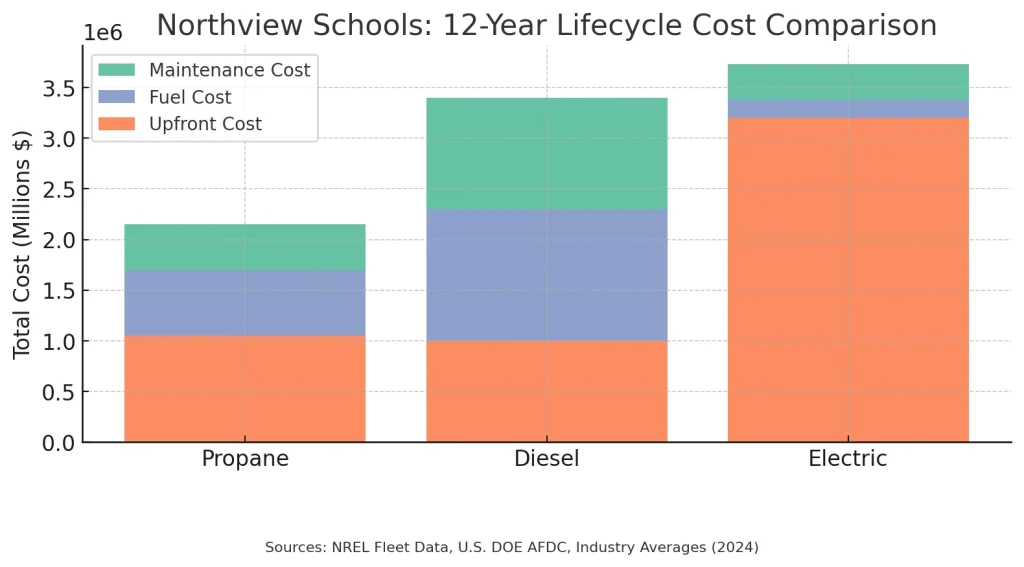Northview Schools Cuts Emissions and Costs with Propane-Powered Buses

Northview Runs on Propane
Propane School Buses: 9 with a 10th on the way
Students Transported Daily: 900-1,000
Significant Fuel Savings: propane cost vs. diesel
In 2020, Northview Public Schools expanded its transportation fleet with six propane-powered school buses, serving more than 900 students across the district in a 14-square-mile area. These buses transport students for field trips and sports team activities, covering an average of 11,000 miles annually per bus. Northview took advantage of the VW Settlement grants through the Fuel Transformation Program, which funded the replacement of qualifying diesel vehicles with new, cleaner versions that have low-to-no emissions. Propane fits as the EPA lists propane as “low-emission.”
Tim Christian, Northview’s Transportation Director, stated that the motivation to make the switch to propane was due to the increasing age of their diesel buses, the cost savings, and the cleanliness of the propane buses.
“I had black exhaust marks on our pavement, and our buses sit outside. We are located near three other schools, and the air quality was poor. We just needed new buses, and our district knew we wanted to be cleaner. “
Northview’s propane fleet has grown. In 2025, they purchased three additional propane-powered school buses, with the tenth on the way this fall, bringing their fleet to over 50% of its buses running on propane. This is part of Northview’s commitment to achieving cost savings and improving air quality around their schools and community.
Cleaner, Smarter Transportation
Propane is a nontoxic, low-emission fuel that won’t contaminate air, soil, or groundwater. It’s the third most widely used transportation fuel in the world—right behind gasoline and diesel—and is officially recognized as an alternative fuel under the Energy Policy Act of 1992.
A West Virginia University study found that propane-powered school buses produce 96% fewer nitrogen oxide (NOx) emissions than their diesel counterparts. Since NOx contributes significantly to smog and can trigger asthma and other respiratory issues, propane offers a cleaner, healthier option, especially for children who rely on school buses daily.
Tim stated in a recent interview with the Michigan Propane Gas Association, “Propane is very clean; it’s EPA-approved. It’s sold as one of the cleanest, if not the cleanest, way to go, and that was our goal back in 2020. We wanted to get rid of our older buses, and you could see the black smoke coming out of them, especially when they regenerated. It wasn’t a pretty sight. Now we can say for sure with our nine propane buses, and tenth bus on the way, we are for sure clean.”
According to data from the Alternative Fuels Data Center (AFDC), Northview Schools is saving over 40,000 pounds of CO2 annually by using propane buses instead of diesel, equivalent to planting over 300 trees to offset the CO2 emissions that diesel would have added to the air.
“Our community likes the cleaner aspect. We weren’t ready to go electric. Propane was a great way to get to the goal in a cost-efficient manner, so in 2020, we pulled the trigger to do this, and we have been really happy with our transition to propane.”
Tim Christian, Transportation Director, Northview Public Schools
Cost-Effective Fleet Strategy
Propane is incredibly affordable. Compared to diesel and electric options, propane buses are less expensive to fuel and maintain. For Northview, that means more dollars can be allocated toward classrooms and student programs, rather than transportation operations. Propane’s upfront costs are incredibly low, and long-lasting.
With all the incentives to switch to propane, Tim reported that they saved around $240,000 in 2020 by purchasing six propane buses, saving $40,000 on each bus. “Cost savings were huge.”
“At the end of the day, I am saving a lot of money by going with propane. Maintenance is much less, too,” Tim reported. There were significant savings from switching to propane buses, estimated at over $300,000 in savings for their district’s nine buses, including a potential savings of $25,000 per bus in maintenance costs.
Safe for Students, Trusted by Schools
Propane-powered vehicles are a proven safe option for both drivers and passengers. In Michigan, over 700 propane school buses are already on the road, serving more than 40 school districts with a fuel that’s both dependable and cost-effective. Propane fuel tanks are built for safety—they’re made from carbon steel and are 20 times more puncture-resistant than gasoline or diesel tanks. Each tank meets strict standards set by the American Society of Mechanical Engineers, ensuring long-term durability in student transportation.
Propane also has safety advantages at the pump. It has a narrower flammability range than gasoline or diesel, reducing the risk of unintentional ignition. Plus, every propane fueling station is equipped with a lock-off valve that automatically shuts off the flow if a pressure drop is detected, adding an extra layer of protection for school fleets.
“The bus is super safe, easy to fuel,” Tim reported.
From Diesel to Propane: The Transition Built for Fleets
Transitioning your fleet to propane is a straightforward move, especially when you factor in its performance, cost savings, and reliability.
The transition to propane was easy, from the infrastructure to the fueling. Tim joked, “If I can do it, anyone can do it.”
“It wasn’t difficult at all. We had to run some electricity out to the tank. We had to put in some crash protectors and some cement work, but you get the right contractors, it was pretty easy. We have an electrician on staff so he was able to run the electric right to the new propane pump. It was not difficult at all.”
Most schools contact their local propane company to procure a propane contract and have a propane storage tank installed on-site, as seen at Northview Schools. However, there are other fueling options available to schools, such as public fueling stations and mobile fueling services. Tim reported that some training was involved with the mechanic and the director, but it was “super simple,” covering emergency shut-offs, the same style of training used for their in-ground diesel and gasoline storage tanks. He even mentioned that his drivers could fill the buses with some training; an hour of training for drivers, “If my drivers can do it, anyone can do it.”
“Propane is about as hard as filling with diesel or a gas. The nozzle is a little different; ours is a screw on nozzle (ACME). Super simple. The only difference is they ask you to wear gloves and face protection, “ Tim said, “Easy, not dangerous at all, it’s basically just like filling up your tank like any other way.” There are two types of nozzles for propane autogas dispensers. ACME, the screw on kind that Northview has, which requires personal protective equipment, such as gloves and a face shield, and a Type K15 or Euro nozzle on newer units, which is a quick-release, plug-and-go option that Livonia Public Schools has and does not require personal protective equipment.
Ready for Snow, Ice, and Everything in Between
Northview’s propane buses start up reliably on cold Michigan mornings—no need for expensive engine block heaters, fuel additives, or backup generators like diesel and electric buses often require. Their operational simplicity translates into better uptime and safer rides for students.
Tim stated, “Here in Michigan, it gets pretty cold in some of the winter days, and we’ve had no problems with the propane buses. Actually, better, they warm up much quicker. Our drivers who drive those propane buses are happy with that. That’s kinda the cool thing.”
“There’s just a lot of pros to the propane buses. We are really happy with the propane buses so far,” Tim mentioned. Northview plans to retain a few diesel transit buses but intends to continue purchasing more propane school buses in the future. “I highly recommend them; they have been really good for us.”
$6,000 Available from the Michigan Propane Gas Association
With budget constraints and a big push to transition Michigan’s fleets to cleaner fuels, the Michigan Propane Gas Association is here to help. The MPGA is offering fleets up to $6,000 to help them immediately reduce transportation operation costs and reach carbon footprint goals. The MPGA propane fleet experts are available to help with a smooth transition to propane with fleet directors/managers, treasurers, and superintendents.
Learn more at: MiAutogas.com/#funding


